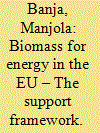| Srl | Item |
| 1 |
ID:
166706


|
|
|
|
|
| Summary/Abstract |
This paper aims to produce a quantitative approach on the overall measures and on public support framework for biomass for energy, based on the EU countries reports under RED and existing literature. The way in which the support for biomass is implemented in the EU energy sector is not similar across EU countries. Feed-in tariffs and feed-in-premiums are still the dominant support schemes for the deployment of bioelectricity, whereas subsidies remain the main support for bioheat. Furthermore, a vast number of EU countries apply mandatory blending quotas for biofuels for transport. The paper shows that biomass for energy has a key role within the EU policy support for RES, in which targets are the main drivers, together with overarching biomass guidelines to anticipate any environmental constraints. Stable support showed the highest effectiveness in the past and remains the key factor for biomass deployment beyond 2020. The renewed targets need to be accompanied by long-term support measures and a commonly shared policy vision. A further harmonization of public bioenergy support towards a single EU cleaner energy market is recommended. This implies four policy actions for all EU countries: in-depth efficiency review, integration with RED-2, compatible sustainability guidelines and local impact assessments.
|
|
|
|
|
|
|
|
|
|
|
|
|
|
|
|
| 2 |
ID:
185097


|
|
|
|
|
| Summary/Abstract |
How do rising powers engage with international institutions? While this question has remained important, we have very few theoretically grounded, empirical studies that look at this engagement. This paper seeks to address that gap by focusing on India's engagement with the International Monetary Fund (IMF). It argues that rising powers engage with the institution's distinctive design, seeking to change features such as the rules for controlling the institution. The issues the institution covers matter: the nature of the issue area can facilitate engagement. For example, in the case of India's engagement with the IMF, the technical nature of the issue arena provided autonomy to the executive and facilitated the process of formulating and implementing its strategy. The Indian executive has engaged mostly with formal rules during the period under review. Contrary to expectations that status-quoist institutions will normally discourage states from seeking change, the paper finds that India expended its resources to influence quota reform.
|
|
|
|
|
|
|
|
|
|
|
|
|
|
|
|
| 3 |
ID:
187591


|
|
|
|
|
| Summary/Abstract |
In the present study, a novel approach for calculating optimal quota and tax regimes is investigated. A meta-heuristic framework has been developed to find the optimal quota regime for the national or worldwide aviation industry. The minimization of ticket prices and CO2 emissions are considered to be objective functions. The results of the current study indicate that implementing optimized quotas is more effective than intensive tax regimes. To elaborate, much more important than the value of the carbon price is the shape (convexity or concavity) of the tax regime. The optimal tax regime shape is also obtained. Based on the optimal quota and tax regime, the concept of golden time and value is introduced. In the golden time window, investing in Sustainable Aviation Fuels (SAFs) will be the most cost-effective. Furthermore, the results demonstrate that neither the sole introduction of quotas nor the imposition of high carbon taxes are beneficial from an economic and decarbonization standpoint. Thus, an optimized quota regime should be employed. These quotas should be introduced as soon as possible, and their implementation should be combined with political efforts to introduce a carbon tax and policies supporting the development of an alternative jet fuel industry.
|
|
|
|
|
|
|
|
|
|
|
|
|
|
|
|